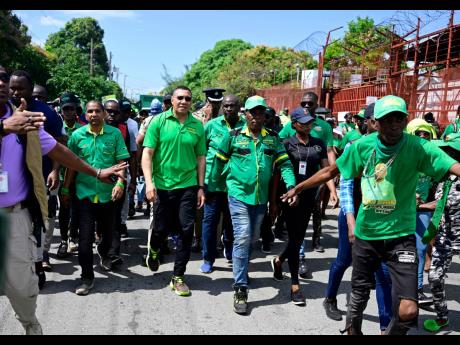
Latest Election News
‘We never feared any election’
By:

Image caption: Jamaica Labour Party Leader Andrew Holness and candidates Delroy Williams, Seivwright Gardens Division; Christopher Townsend, Olympic Gardens division; and Glendon Salmon, Molynes Gardens division arrive with supporters at the St Andrew West Central nomination centre on Thursday.
Prime Minister Andrew Holness, the leader of the Jamaica Labour Party (JLP), says his Government has no fear of the outcome of the local government elections, disclosing yesterday that he mulled twinning the ballot with the general election in 2020.
Holness, who was speaking at the Waltham Education Centre in the St Andrew West Central constituency where three JLP representatives, including Mayor of Kingston Delroy Williams, were nominated, said the delay in the vote was because of the coronavirus pandemic.
Several critics, including the parliamentary opposition which threatened court action over any further delay, have argued that unfavourable internal poll numbers for the governing party forced the delays.
The election was constitutionally due four years ago.
Holness, however, rubbished the argument, declaring that his party remains in a strong position with the electorate.
“The intention was, from my point in 2020, when we called the general election, I wanted to call the local government election at the same time,” Holness told journalists outside the nomination centre yesterday.
“In fact, we made arrangements for it,” he added.
The prime minister noted that amendments were made to the legislation for this but said there was uncertainty, both on the part of the Government and Opposition, in terms of what the impact would be, given the pandemic.
“So, we never feared any election. We wanted to do it,” he asserted.
Holness said that, on reflection, the election should have been called at that time, but noted that several strains of COVID-19 and the need for “severe” countrywide lockdowns were hindrances.
ECONOMIC FALLOUT
He said, too, that the economic fallout weighed heavily against sending Jamaicans to a second poll.
“Certainly, I don’t think that the Jamaican people would be in the frame of mind to contend with another election. And that is just the reality, and that, in itself, shows why it may be very difficult to have a fixed election date in our system of government,” he said.
Holness said while the latter issue was a promise made by him in the run-up to the 2016 general election, concerns were raised in terms of whether this aligned with the country’s Constitution.
He said his administration examined the British model of fixed election dates, which adds greater certainty and less disruption to the country’s business cycle.
However, he said, with further research and legal advice, “certain concerns were raised as to whether or not fixed election dates would fit within our constitutional arrangement”.
He pointed out that, in the absence of a constitution in the United Kingdom, conventions are what are used, suggesting that there is little difficulty in instituting changes.
This arrangement, he said, allowed for the holding of early British elections during the past few years.
“And it so turned out that the succeeding government changed that law, reverting to what existed before. It says to us that we have to look at it very carefully. Not everything that is promoted as having benefits can actually be done right away,” the prime minister said.
“It’s aspirational but we have to make sure that it fits within our constitutional regime, which clearly has a fixed election date which is, you have a five-year term and it is specified how long you can go beyond that if there are some supervening or epiphenomenal events,” Holness said.
“So, there are provisions for that and I would say that the system as it is does work. It can use some refinement, but I would want to make sure that, if we make any changes, using this issue of fixed election dates, that it fits within our Constitution,” said Holness.
He said the Electoral Commission of Jamaica is also looking at this consideration, though the advice from the Attorney General’s Chambers “so far is that there may be some issues”.
Join the Discussion
#JAVOTES2024 TweetsElection News
#JAVOTES2024 | Manchester North Eastern running smoothly
Polling stations for the local government elections are in full swing at Christiana High School in Manchester North Eastern, under the watchful eye of supervisor Heather Cole. Her primary role is to ensure a seamless and orde
#JAVOTES2024 | Voter turnout at 11.12 per cent so far
The Electoral Commission of Jamaica is reporting that at 10 a.m., 11.12 per cent of the more than two million registered voters had turned out for voting in today's local government elections. This is slightly better than
#JAVOTES2024 | PNP’s Oliver Reid expresses concern about handling of ballots
The People's National Party's candidate for the Little London Division in Westmoreland Oliver Reid today raised concerns about the handling of ballots. According to him, he noticed instances where the ballots of
